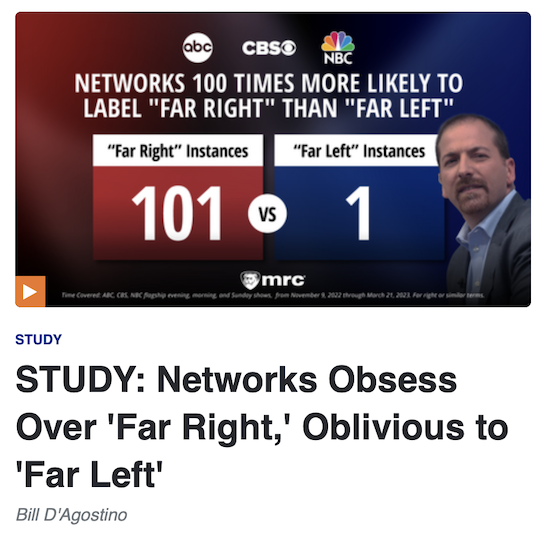The Media Research Center is having another labeling meltdown. Bill D’Agostino whined in a March 24 post:
Television broadcast networks tend to slap a “far-right” label onto anything even remotely conservative, often referring to Republican members of Congress, fringe conspiracy theorists, and outright domestic terrorists with identical terminology for all three. Yet these same networks refuse even to acknowledge the existence of a “far-left,” — and in fact, since the 2022 midterms, they have not applied that label to any group or individual even a single time.
An MRC study found that between November 9, 2022 (the day after the 2022 midterm elections) and March 21, broadcast networks ABC, CBS, and NBC used such labels as “far-right,” “extreme right,” and “ultraconservative,” a total of 101 times on their flagship morning and evening shows, as well as their Sunday political talk shows. During that same period, analysts found only one instance in which a journalist used an equivalent “far-left” label.
[…]Across all three broadcast networks, the totality of airtime the fringe left received since November was limited to that single vague reference.
Meanwhile, “far-right” and similar labels were applied to a very wide array of individuals. Republican members of Congress were by far the most heavily labeled group (38 times), followed by general references such as “the far right,” or “extreme rightwing Twitter users,” (19 times). There were 12 instances of labeling for the administration of Israeli Prime Minister Benjamin Netanyahu, 11 cases for the Oathkeepers, 10 cases for the radical German group that attempted a coup in late 2022, and five for the supporters of former Brazilian president Jair Bolsonaro. All others were labeled only once or twice.
But just as the MRC did with Benjamin Netanyahu’s government in Israel and Republicans who opposed Kevin McCarthy as House speaker, D’Agostino made no attempt to dispute the accuracy of the”far-right” label — as per MRC procedure, he’s just mad that the label was reported at all. And, of course, this performative outrage is utterly hypocritical, since he and his co-workers love to promiscuously throw around the “far-left” label at pretty much anything it thinks isn’t conservative enough. Here are the people and things the MRC has labeled as “far-left” in just the first four months of this year:
- the studio audience for “The View”
- the idea of allowing more refugees to settle in the U.S.
- MSNBC
- New Zealand Prime Minister Jacinda Ardern
- the Women’s March
- comedians Marc Maron, Stephen Colbert and Margaret Cho
- The Nation magazine (which is actually called “far, far left”)
- NPR and PBS
- Biden administration assistant Ian Sams
- attorney Benjamin Crump
- NPR and PBS, again
- CNN correspondent Leyla Santiago
- Research and strategy center Political Research Associates
- MSNBC host Joe Scarborough
- a character in the sitcom “Grown-ish”
- author Ta-Nehisi Coates
- Rep. Ilhan Omar
- Stephen Colbert, again
- Rep. Jamie Raskin
- CNN
- Sen. Bernie Sanders
- the “trans cult”
- The Nation, again
- entertainment-news website Deadline
- the Southern Poverty Law Center
- Jane Fonda
- the Hollywood Reporter
- CBS
- director Alex Gibney
- NPR, again
- the Hollywood Reporter, again
- Rep. Jamaal Bowman
- district attorney Alvin Bragg
- George Soros
- Alvin Bragg, again
- Jacinda Ardern, again
- journalists David Cay Johnston
- NBC’s “Today” show
- Rep. Katie Porter
- NPR, again
- MSNBC, again
- Alvin Bragg, again
- comedian John Oliver
- political funding platform Act Blue
- The Los Angeles Times
- Rolling Stone
By contrast, when the MRC uses the term “far-right,” it’s usually in the context of complaining that others use it, not to put that label on people or groups. Of course, D’Agostino played hypocritical whataboutism on that too:
There is no arguing that far-right extremists exist in the U.S. and abroad. Rather, what’s at issue here is the media’s inability to acknowledge extremism on the left. It seems that whenever they do bother to report on the misdeeds of far-left actors, they meticulously avoid ideological labels.
If the MRC can’t apply “far-right” to the extent it uses “far-left,” it has no standing to complain about how others use labels. This is why no legitimate media critic takes the MRC seriously — they care about partisan politics, not journalism.
